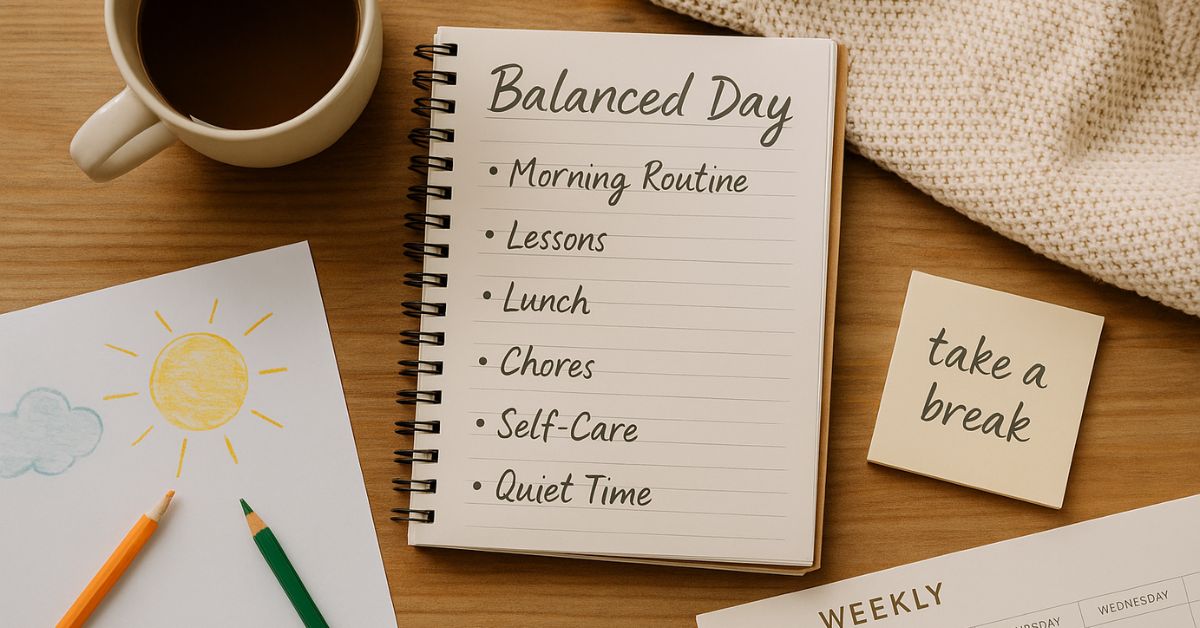Homeschooling is deeply rewarding, but it can also feel like a juggling act. Between teaching children, managing a household, and possibly working, homeschool parents face unique challenges in maintaining work-life balance. At the same time, prioritizing self-care can seem like an impossible luxury. The good news is that finding balance in homeschooling is achievable with proactive planning and realistic strategies.
Prioritizing Work-Life Balance For Homeschoolers
Balancing homeschooling responsibilities with other roles as a parent can feel overwhelming, but the key lies in setting priorities and boundaries. Here are several approaches to reclaiming a sense of balance:
Establish a Homeschool Routine
Creating a consistent, adaptable daily routine is essential for homeschooling success. While flexibility is one of homeschooling’s greatest perks, having a structure ensures that both educational and personal needs are met. Here’s how to design an effective routine:
- Block Schedule: Divide the day into chunks for specific purposes, such as morning learning, outdoor activities, and afternoon independent study.
- Include Breaks: Incorporate downtime for both you and your children to reset mentally and physically.
- Set Specific Goals: Outline realistic daily learning goals to manage expectations and focus on progress rather than perfection.
By organizing your day around priorities, you can streamline tasks and create space to handle work and household needs without feeling scattered.
Outsource and Delegate When Possible
No one can do it all, and asking for help is not a weakness. Whether it’s outsourcing certain tasks or delegating responsibilities within your household, sharing the load is crucial. Some ways to lighten your workload include:
- Hiring a tutor or enrolling children in co-op classes for subjects that require extra expertise.
- Using meal delivery services or batch-cooking meals ahead of time.
- Assigning age-appropriate chores to your children to foster independence while easing your own burden.
By sharing responsibilities, you’ll free up precious time for your own priorities—whether it’s work, family commitments, or relaxation.
Set Dedicated Work Hours
If you’re a working homeschool parent, separating work hours and homeschool hours is essential. Blurring the lines can lead to stress and reduced productivity. Consider these strategies for creating boundaries:
- Designate a Workspace: Set up a clear area where you focus only on work. Communicate to your children that when you’re in this space, you are unavailable except for emergencies.
- Use Time-Blocking Tools: Apps and planners can help you allocate specific chunks of time for business tasks, homeschool lessons, and relaxation.
- Schedule Quiet Activities for Kids: Use naptime, independent reading, or quiet play periods as opportunities to tackle work that requires deep focus.
Clear boundaries not only improve your effectiveness, but also give your children a consistent framework to understand when you are accessible to them.

Practical Self-Care Tips For Homeschool Parents
Taking care of yourself is vital when homeschooling. Burnout is a real risk for parents who give their all without recharging. By investing in self-care, you’ll have more energy and patience to meet your family’s needs. The following tips can point you in the right direction:
Make Time for Exercise and Wellness
Physical movement and mindful habits aren’t just great for your health—they’re also powerful stress-busters. Even small steps can make a big difference:
- Take family walks or bike rides to combine exercise with quality time.
- Schedule “movement breaks” during the day to stretch or practice yoga.
- Meditate for a few minutes to reset during particularly stressful moments.
Including wellness activities into your homeschool schedule not only models healthy habits for kids but also leaves you feeling more alert and centered.
Build a Support System
It’s easy to feel isolated as a homeschool parent, especially if most of your days are spent at home with children. Having a reliable support network helps you restore balance and gain encouragement. Try these ideas:
- Join Local Homeschool Communities: Many areas have homeschool groups that organize meetups, field trips, and support sessions.
- Stay Connected Virtually: Online forums and social media groups are valuable resources for advice, emotional support, and tips from experienced homeschoolers.
- Enlist Your Partner’s Help: If you have a spouse or partner, discuss ways to share homeschool responsibilities, parenting duties, or even personal time.
Having people to lean on fosters a greater sense of community and reduces feelings of loneliness.
Minimizing Overwhelm Through Simplification
When life feels chaotic, the solution isn’t always to do more—it’s often to do less. Simplifying your homeschooling and parenting approaches can eliminate unnecessary stress, leaving more room for what truly matters.
Streamline Your Curriculum Choices
An overcomplicated curriculum is one of the biggest stressors for homeschool families. With so many resources available, it’s easy to fall into the trap of over-scheduling or trying to cover too much ground. Instead, focus on simplicity:
- Choose multi-age curricula or unit studies to teach multiple children at once.
- Stick to the essentials in core subjects like math, reading, and writing, then build in electives selectively.
- Use online resources and workbooks for independent learning to take some teaching pressure off yourself.
Fewer, high-quality resources often lead to better outcomes—and less stress.
Declutter Your Physical Environment
A cluttered home can contribute to mental clutter. Creating a tidy and organized learning space benefits everyone involved:
- Designate specific storage containers for school supplies, books, and completed projects.
- Teach your children to clean up their learning materials at the end of the day as part of their routine.
- Keep a minimalistic mindset by regularly evaluating which materials you really need and donating what you don’t.
A streamlined environment helps you feel more in control of your space and reduces daily frustrations.
Nurturing Your Emotional Well-Being
Your emotional health is just as important as physical self-care, especially when navigating the highs and lows of homeschooling. Stress, guilt, or a sense of inadequacy might creep in, but addressing these emotions head-on will help you sustain balance.
Practice Self-Compassion
Cut yourself some slack—it’s okay to have off days or moments when everything feels hard. Remember:
- Comparing your homeschool methods to others’ isn’t productive. Every family is different.
- Progress is more important than perfection. Focus on long-term growth, not just daily outcomes.
- You’re doing meaningful work, even when it isn’t immediately visible.
Shifting your mindset toward self-forgiveness can ease unnecessary pressure and allow you to approach challenges more calmly.
Schedule “Me Time”
Intentional time for yourself is crucial, even if it seems tricky to carve out. It could be something small, like:
- Reading a book for pleasure after the kids are in bed.
- Enjoying a hobby you love, such as crafting, gardening, or photography.
- Spending an hour out of the house for a coffee date or solo shopping trip.
Regularly reconnecting with your interests helps recharge your mental energy and reminds you that you’re more than just a homeschool parent.
A Delicate Balancing Act
Homeschooling parents perform a delicate balancing act between teaching, parenting, and handling day-to-day life. But finding balance in homeschooling isn’t just possible—it’s essential for you and your family’s well-being. From setting boundaries around work and school to prioritizing self-care and simplifying routines, these strategies empower you to reclaim balance and thrive in your homeschooling journey. Instead of striving for perfection, aim for sustainability and small, consistent improvements that nourish not only your children’s education but also your own mental, emotional, and physical health. Balance might not mean an equal division of time, but with the right practices, it can mean greater harmony and fulfillment.





